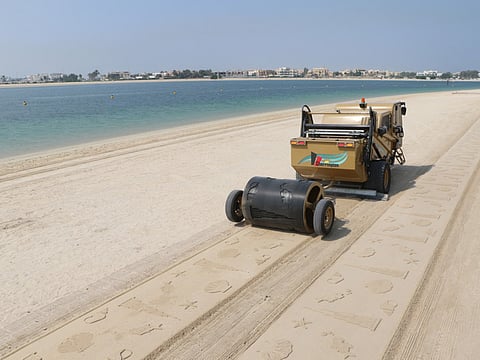Meet the team that keeps Dubai clean
Thousands of Dubai Municipality workers are responsible for the city’s sparkle

Dubai: Even before you wake up, the city is scrubbed clean. Dubai residents produce 9,000 tonnes of waste every day, but you would be hard-pressed to see it in public.
The Dubai Municipality’s Waste Management Department is responsible for ensuring Dubai’s roads, highways and beaches are cleaned round the clock. The department employs 2,500-3,000 workers, and the street cleaners spend five to six hours every day, with the first shift reporting for duty at 5am.
But when it comes to city-wide celebrations, like the UAE National Day and New Year’s Eve, the task of keeping public areas clean becomes even more challenging. However, Abdul Majeed Abdul Aziz Saifaie, the director of the Waste Management Department, said that over the years his department has worked out the perfect strategy to manage the extra work.
Saifaie said: “It has become a habit for us to cover these big events, so we have programmed our work. We wait and start our hard work after 12midnight. It is going to be a mess at that time but hopefully by 5-6am at the most, everything is clean.”
He manages his team in such a way that no worker is forced to work for longer hours. Instead, by adding the number of workers and strategically targeting the more popular areas, Dubai Municipality is able to clean up after world record breaking celebrations.
However, even the daily clean-up of Dubai’s roads, markets and business districts can be a challenge. Teams, therefore, are structured in such a way that cleaners and foremen report to the Area Inspector and the Area Officer, with the areas of higher population getting more manpower.
Beaches and highways have a special team, trained to tackle the challenges in their specific area of municipal work.
Residents can also contact Dubai Municipality on their toll free number 800 900 to report any areas that require more attention.
Apart from placing garbage bins in every corner of the city, the Municipality is also focused on providing options for recycling, with 13 recycling centres across the UAE near public areas like parks and municipality offices.
“We have three recycling facilities, one has running from eight years called Tadweer and two others will start from the first quarter of 2018. Each one has a capacity of 2,000 tonnes. Today, we have a production of 9,000 tonnes of waste per day. So hopefully in 2018, 6,000 tonnes of that waste will go to these recycling areas. We also recently signed a contract with private sector to convert waste to energy, which will be will be in operation by 2020. That in itself can take 4,000 tonnes of waste,” Saifaie said.
A basic courtesy
However, Saifaie urged residents to practice basic civic sense to help the thousands of workers cleaning the city tirelessly.
“The most challenging areas we have are the Central Business Districts like Naif Road, Karama or Bur Dubai. The easiest way for people to help us control waste production and clean-up is for them to place the waste in the right place. If they place the waste in the bin provided, life would be easy for our workers. But unfortunately, people want to make their own lives easy, so they just put the waste next to the bin or just throw it without garbage bags. So, if you want to throw your waste, just do it properly,” he said.



